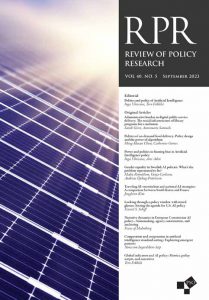Inga Ulnicane
 These days Artificial Intelligence (AI) is high on international political agenda. The US president Biden has just issued an executive order on safe, secure and trustworthy AI. G7 leaders have agreed on Guiding Principles and a Code of Conduct on Artificial Intelligence. The UK is hosting the first global AI Safety Summit. However, not everyone is impressed. More than 100 civil society organizations, experts and campaigners in their open letter call the summit ‘a missed opportunity’ and point out that ‘communities and workers most affected by AI have been marginalized by the summit’.
These days Artificial Intelligence (AI) is high on international political agenda. The US president Biden has just issued an executive order on safe, secure and trustworthy AI. G7 leaders have agreed on Guiding Principles and a Code of Conduct on Artificial Intelligence. The UK is hosting the first global AI Safety Summit. However, not everyone is impressed. More than 100 civil society organizations, experts and campaigners in their open letter call the summit ‘a missed opportunity’ and point out that ‘communities and workers most affected by AI have been marginalized by the summit’.
This is just one recent controversy surrounding AI politics and policy, which is often characterized by high concentration of power in a small number of big tech companies, with limited opportunities for participation of civil society organizations. Emerging governance of AI raise many crucial political questions: Who is included in and who is excluded from decision-making? What is the role of government in governing AI? And how is power distributed among different social groups?
Challenging established hierarchies
These and similar questions are at the core of our recent special issue Politics and Policy of Artificial Intelligence(Ulnicane & Erkkilä 2023), published in Review of Policy Research. This special issue brings together nine research articles to advance the studies of politics and policy of AI by identifying emerging themes and setting out future research agenda. These articles examine how collective decisions and policies of AI are made, priorities set and goals chosen in the context of plurality of actors, views, ideas and values in Europe, United States, Asia-Pacific and global forums. They highlight that issues of politics and policy of AI cannot be settled just by having more expertise and evidence, but instead require an open debate of alternative views, interests and values.
To highlight problematic issues in current AI politics, power and policy, the order of articles in this special issue do not follow the typical hierarchy of political issues that would require us to start with global and regional level developments, followed by national level and finally looking at impacts on social groups. To highlight the need to challenge established power relations and hierarchies and address structural injustices, we turn this traditional order of political issues upside down and start our special issue with focus on the effects of AI on disadvantaged, marginalized and vulnerable groups, such as migrants and minorities. This includes contributions on access to digital public services, working conditions for on-demand food delivery couriers, intersectional bias and gender equality. The following articles analyse AI policy at national and regional levels by looking at socio-technical imaginaries in South Korea and France, changing policy paradigms in the United States and narratives of the European Commission. Finally, we conclude with contributions on global AI standard setting and global indicators.
From rhetoric to implementation
All nine articles in this special issue address five overarching themes: co-shaping of AI by politics and society; the roles of ideas; distribution of power; change and continuity; and relationships between developments at local, national, regional and global level. We conclude our introduction to the special issue (Ulnicane & Erkkilä 2023) with outlining some topics for future research. One particularly promising avenue for further examination would be focus on implementation of adopted AI policies, standards and regulations. While in recent years a considerable attention has been devoted to policy rhetoric and commitments, in future it would be important to analyse if and how declared priorities of AI policy have been implemented.
Politics and policy of AI is a very fast developing topic, that will need continuous attention for years to come. If you are interested to discuss these topics, please join us for the webinar ‘Power, Politics and Policy of Artificial Intelligence’ on 9 November. More information and registration here https://ecpr.eu/Events/255. All welcome!
Ulnicane, I. & Erkkilä, T. (2023) Politics and policy of Artificial Intelligence. Review of Policy Research, 40(5): 612-625. https://doi.org/10.1111/ropr.12574
This entry was initially published on Europe of Knowledge blog.

